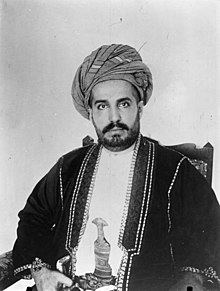Chalid ibn Barghash
Sayyid Chalid bin Barghasch al-Busaidi (* 1874 in Zanzibar , † 1927 in Mombasa , Kenya ; Arabic خالد بن برغش البوسعيد, DMG Ḫālid b. Barġaš al-Busaʿīdī ; also Khalid ibn Barghash ) was the son of the sultan Barghasch ibn Said of Zanzibar and in August 1896 he was sultan himself for three days . As the only feudal ruler of Zanzibar, he had tried to overthrow the British colonial power.
After the death of his uncle Ali ibn Said , Chalid tried for the first time in 1893 to take power in the Sultan's palace. Zanzibar had been under British protectorate since 1890, and Chalid was known as a staunch opponent of the British. As a result, he was arrested by the British consul with the help of British marines, and the British instead appointed an Omani representative of the Said dynasty, Ali's nephew Hamid ibn Thuwaini ibn Said , as the new sultan. Hamid was Chalid's cousin and brother-in-law, he was married to Chalid's sister Nunu. When Hamid died unexpectedly in 1896, Chalid was suspected of having poisoned him.
On August 25, 1896, Chalid and 60 men occupied the palace and fortress of the capital and proclaimed himself Sultan, which led to the brief British-Zanzibarian war , which was traumatic for the East African national consciousness . The German Reich was obviously behind the coup attempt, after the shelling and sacking of Zanzibar by British troops, Chalid fled to the German consulate on August 27, 1896. Instead, another cousin of Khalid, the Omani prince Hammud ibn Muhammad ibn Said , became the new sultan .
Despite British protests, the German Reich granted Chalid asylum and secretly brought him to the East African mainland on board the SMS Seeadler . In the areas ceded by Zanzibar to the German East African Society or the Reich only a few years earlier, Chalid now supported the imperial colonial administration of German East Africa and from then on resided in Dar es Salaam . The German colonial power drew considerable benefit from this, as Chalid exercised a calming influence on the aristocratic upper classes of the coastal zone, which had been dissatisfied since the "Arab uprising" .
When the First World War between Germany and Great Britain broke out, Khalid was initially a bargaining chip and a German candidate for any plans to overthrow Sultan Khalifa ibn Harb , who had ruled Zanzibar since 1911 , but was captured by the British when Dar es Salaam fell in 1916.
The British banished him first to the Seychelles off the East African coast , then even further away to the Atlantic island of St. Helena , where he was from 1917–1921. Finally he was allowed to return to East Africa in 1925, but not to Zanzibar, and died in 1927 in Mombasa, which until 1888 had also belonged to the Sultanate of Zanzibar .
literature
- Heinrich Loth: History of Africa from the beginnings to the present, Part II: Africa under imperialist colonial rule and the formation of anti-colonial forces 1884–1945, p. 31 f. Akademie-Verlag, Berlin 1976.
- PJL Frankl: The Exile of Sayyid Khalid bin Barghash Al-BuSa'idi . British Journal of Middle Eastern Studies, 2006.
- Heinz Schneppen : Sayyid Ḫālid b. Barġaš: Three days of the Sultan - thirty years in exile. In: Islam. Vol. 76, Issue 2 (1999), pp. 299-312.
- Walther Schücking , who in DJZ , vol. 5 (1900), p. 202, treats the adventurous transfer from Zanzibar as an "interesting case of international law"; Digitized at MPIER .
Web links
Individual evidence
- ↑ query.nytimes.com: AN AFFRONT TO ENGLAND - GERMANY TAKES SAID KHALID UNDER HER PROTECTION. , October 3, 1896, accessed January 30, 2011
- ↑ Julien Durup: The Exile Sayyid Khalid bin Barghash Al-Busaidi in the Seychelles. In: seychellesweekly.com. September 5, 2010, accessed October 15, 2017 .
| personal data | |
|---|---|
| SURNAME | Chalid ibn Barghash |
| ALTERNATIVE NAMES | Chalid ibn Barghasch ibn Said |
| BRIEF DESCRIPTION | Sultan of Zanzibar |
| DATE OF BIRTH | 1874 |
| PLACE OF BIRTH | Zanzibar |
| DATE OF DEATH | 1927 |
| Place of death | Mombasa , Kenya |
